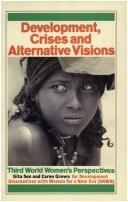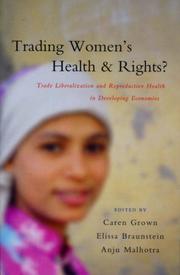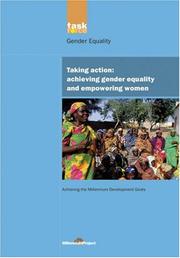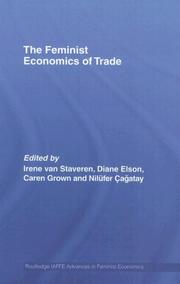| Listing 1 - 10 of 11 | << page >> |
Sort by
|
Digital
ISBN: 9780415568227 9781552504697 Year: 2010 Publisher: London Routledge
Abstract | Keywords | Export | Availability | Bookmark
 Loading...
Loading...Choose an application
- Reference Manager
- EndNote
- RefWorks (Direct export to RefWorks)
Sociology of the family. Sociology of sexuality --- Taxes --- Developing countries

Abstract | Keywords | Export | Availability | Bookmark
 Loading...
Loading...Choose an application
- Reference Manager
- EndNote
- RefWorks (Direct export to RefWorks)
Book
Year: 1989 Publisher: London Pergamon
Abstract | Keywords | Export | Availability | Bookmark
 Loading...
Loading...Choose an application
- Reference Manager
- EndNote
- RefWorks (Direct export to RefWorks)
Book
ISBN: 9780415492621 Year: 2010 Publisher: Abingdon Routledge
Abstract | Keywords | Export | Availability | Bookmark
 Loading...
Loading...Choose an application
- Reference Manager
- EndNote
- RefWorks (Direct export to RefWorks)
Fiscal policy --- Taxation --- Women --- Government policy

ISBN: 1848137923 184813178X 1281216208 9786611216207 9781848131781 9781281216205 1842777742 9781842777749 1842777750 9781842777756 1350223689 Year: 2006 Publisher: London Zed
Abstract | Keywords | Export | Availability | Bookmark
 Loading...
Loading...Choose an application
- Reference Manager
- EndNote
- RefWorks (Direct export to RefWorks)
This work synthesises research from various disciplines to explore how international trade liberalisation affects reproductive health and rights, reviewing both direct and indirect linkages and using case studies from Bangladesh, Sri Lanka, Tanzania and Mexico.
Free trade --- Women --- Women's rights --- Human females --- Wimmin --- Woman --- Womon --- Womyn --- Females --- Human beings --- Femininity --- Health and hygiene --- Sociology of the family. Sociology of sexuality --- Foreign trade. International trade --- Developing countries: economic development problems --- Hygiene. Public health. Protection --- Developing countries --- Reproductive Rights --- Women's Rights --- Developing Countries. --- Reproductive Health Services --- Women's Health --- Human rights --- Gender studies: women --- Economics --- Birth control, contraception, family planning --- Developing Nations --- Least Developed Countries --- Less-Developed Nations --- Third-World Nations --- Under-Developed Nations --- LMICs --- Less-Developed Countries --- Low Income Countries --- Low and Middle Income Countries --- Lower-Middle-Income Country --- Middle Income Countries --- Third-World Countries --- Under-Developed Countries --- Countries, Middle Income --- Countries, Third-World --- Country, Least Developed --- Country, Less-Developed --- Country, Low Income --- Country, Lower-Middle-Income --- Country, Middle Income --- Country, Third-World --- Country, Under-Developed --- Developed Country, Least --- Developing Country --- Developing Nation --- Least Developed Country --- Less Developed Countries --- Less Developed Nations --- Less-Developed Country --- Less-Developed Nation --- Low Income Country --- Lower Middle Income Country --- Lower-Middle-Income Countries --- Middle Income Country --- Nation, Less-Developed --- Nation, Third-World --- Nation, Under-Developed --- Third World Countries --- Third World Nations --- Third-World Country --- Third-World Nation --- Under Developed Countries --- Under Developed Nations --- Under-Developed Country --- Under-Developed Nation --- economics. --- Reproductive health --- Trade --- International --- Migration --- Labour market --- Reproductive rights --- Employment opportunities --- Book --- Globalization --- Economy

ISBN: 1844072223 Year: 2005 Publisher: London Earthscan
Abstract | Keywords | Export | Availability | Bookmark
 Loading...
Loading...Choose an application
- Reference Manager
- EndNote
- RefWorks (Direct export to RefWorks)
Sociology of the family. Sociology of sexuality --- Development aid. Development cooperation --- Finances --- Equal opportunities --- Violence --- Reproductive health --- International --- Sustainability --- Girls --- Labour --- Education --- Development policy --- Political participation --- Reproductive rights --- Book --- Chiffres --- Property rights --- Empowerment --- Developing countries

ISBN: 0415770599 0415436370 9780415770590 9780415436373 Year: 2007 Publisher: London Routledge
Abstract | Keywords | Export | Availability | Bookmark
 Loading...
Loading...Choose an application
- Reference Manager
- EndNote
- RefWorks (Direct export to RefWorks)
Sociology of the family. Sociology of sexuality --- Trade theory --- Feminism --- Gender --- Trade --- International --- Pay gap --- Labour market --- Book --- Globalization --- Discrimination --- Economy

ISBN: 1136550143 1280475382 9786610475384 1849773564 6000000960 1423708733 9781849773560 9781423708735 1844072223 9781844072224 9781136550140 9781280475382 6610475385 9786000000967 Year: 2005 Publisher: London ; Sterling, Va. : Earthscan,
Abstract | Keywords | Export | Availability | Bookmark
 Loading...
Loading...Choose an application
- Reference Manager
- EndNote
- RefWorks (Direct export to RefWorks)
The Millennium Development Goals, adopted at the UN Millennium Summit in 2000, are the world's targets for dramatically reducing extreme poverty in its many dimensions by 2015�income poverty, hunger, disease, exclusion, lack of infrastructure and shelter�while promoting gender equality, education, health and environmental sustainability. These bold goals can be met in all parts of the world if nations follow through on their commitments to work together to meet them. Achieving the Millennium Development Goals offers the prospect of a more secure, just, and prosperous world for all. The UN Millennium Project was commissioned by United Nations Secretary-General Kofi Annan to develop a practical plan of action to meet the Millennium Development Goals. As an independent advisory body directed by Professor Jeffrey D. Sachs, the UN Millennium Project submitted its recommendations to the UN Secretary General in January 2005. �The core of the UN Millennium Project's work has been carried out by 10 thematic Task Forces comprising more than 250 experts from around the world, including scientists, development practitioners, parliamentarians, policymakers, and representatives from civil society, UN agencies, the World Bank, the IMF, and the private sector. This report lays out the recommendations of the UN Millennium Project Task Force on Education and Gender Equality. The Task Force recommends seven strategic priorities: strengthen postprimary education for girls while ensuring universal primary education; guarantee sexual and reproductive health and rights; reduce women's and girls' time burdens; guarantee property and inheritance rights; eliminate gender inequality in employment; increase women's participation in government; and significantly reduce violence against women. Action on these priorities will enable countries in every region of the world to achieve gender equality and women's empowerment by 2015.
Women --- Educational equalization --- Human females --- Wimmin --- Woman --- Womon --- Womyn --- Females --- Human beings --- Femininity --- Education --- Legal status, laws, etc.
Book
Year: 2008 Publisher: [Washington, D.C. : World Bank,
Abstract | Keywords | Export | Availability | Bookmark
 Loading...
Loading...Choose an application
- Reference Manager
- EndNote
- RefWorks (Direct export to RefWorks)
"Ownership and control over assets such as land and housing provide direct and indirect benefits to individuals and households, including a secure place to live, the means of a livelihood, protection during emergencies, and collateral for credit that can be used for investment or consumption. Unfortunately, few studies - either at the micro or macro levels- examine the gender dimensions of asset ownership. This paper sets out a framework for researchers who are interested in collecting data on individual level asset ownership and analyzing the gender asset gap. It reviews best practices in existing surveys with respect to data collection on assets at both the household and individual levels, and shows how various questions on individually owned assets can be incorporated with a minimum of effort and cost into existing multi-topic household surveys, using examples of three Living Standard Measurement Study surveys: the 1998-99 Ghana survey, the 2000 Guatemala survey, and the 1997-98 Vietnam survey questionnaires. The analysis shows that it is feasible to add a minimal set of questions to enable calculation of the gender asset gap. Adding a series of extra questions will permit a more satisfactory and nuanced analysis of asset acquisition, use, disposition, and valuation - information that is critical for policies promoting gender equality, poverty reduction, and economic growth. "--World Bank web site.
Gender-based analysis. --- Right of property --- Sex differences. --- Gender mainstreaming.
Book
Year: 2008 Publisher: [Washington, D.C. : World Bank,
Abstract | Keywords | Export | Availability | Bookmark
 Loading...
Loading...Choose an application
- Reference Manager
- EndNote
- RefWorks (Direct export to RefWorks)
"Ownership and control over assets such as land and housing provide direct and indirect benefits to individuals and households, including a secure place to live, the means of a livelihood, protection during emergencies, and collateral for credit that can be used for investment or consumption. Unfortunately, few studies - either at the micro or macro levels- examine the gender dimensions of asset ownership. This paper sets out a framework for researchers who are interested in collecting data on individual level asset ownership and analyzing the gender asset gap. It reviews best practices in existing surveys with respect to data collection on assets at both the household and individual levels, and shows how various questions on individually owned assets can be incorporated with a minimum of effort and cost into existing multi-topic household surveys, using examples of three Living Standard Measurement Study surveys: the 1998-99 Ghana survey, the 2000 Guatemala survey, and the 1997-98 Vietnam survey questionnaires. The analysis shows that it is feasible to add a minimal set of questions to enable calculation of the gender asset gap. Adding a series of extra questions will permit a more satisfactory and nuanced analysis of asset acquisition, use, disposition, and valuation - information that is critical for policies promoting gender equality, poverty reduction, and economic growth. "--World Bank web site.
Gender-based analysis. --- Right of property --- Sex differences. --- Gender mainstreaming.
| Listing 1 - 10 of 11 | << page >> |
Sort by
|

 Search
Search Feedback
Feedback About UniCat
About UniCat  Help
Help News
News